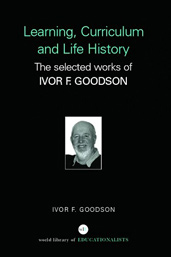Learning, Curriculum and Life Politics: the selected works of Ivor F. Goodson
On Curriculum Form
The Norwood Report argued that throughout Europe, "the evolution of education" had "thrown up certain groups, each of which can and must be treated in a way appropriate to itself." In England three clear groups could be discerned. Firstly
the pupil who is interested in learning for its own sake, who can grasp an argument or follow a piece of connected reasoning, who is interested in causes, whether on the level of human volition or in the material world, who cares to know how things came to be as well as how they are, who is sensitive to language as expression of thought, to a proof as a precise demonstration, to a series of experiments justifying a principle; he is interested in the relatedness of related things, in development, in structure, in a coherent body of knowledge (The Norwood Report 1943, p.2).
These pupils from the continuing clientele of the traditional subject-based curriculum for as Norwood states, "such pupils, educated by the curriculum commonly associated with the Grammar School, have entered the learned professions or have taken up higher administrative or business posts" (p. 2). Secondly, the needs of the intermediate category, "the pupil whose interests and abilities lie markedly in the field of applied science or applied art," were to be fulfilled by the technical schools. Thirdly, Norwood states with a very partial view of educational history, "There has of late years been recognition, expressed in the framing of curricula and otherwise of still another grouping of occupations" (p. 4). This third group was to provide the clientele for the new secondary modern schools.
The pupil in this group deals more easily with concrete things than with ideas. He may have much ability, but it will be in the realm of facts. He is interested in things as they are; he finds little attraction in the past or in the slow disentanglement of causes or movements. His mind must turn its knowledge or its curiosity to immediate test; and his test is essentially practical (The Norwood Report 1943, p. 4).
This curriculum, whilst ruling out certain occupational futures, certainly facilitated those destined for manual work. It "would not be to prepare for a particular job or profession and its treatment would make a direct appeal to interests, which it would awaken by practical touch with affairs" (p. 4).
The Norwood Report summarises the patterns of curriculum differentiation that had emerged through "the evolution of education" over the past century or so. The close alliance between patterns of curriculum differentiation and social structure was often conceded (as in the Taunton Report in 1868): different curricula are explicitly linked to different occupational categories. The academic tradition was for the grammar school pupil destined for the learned professions and higher administrative or business posts. The more utilitarian curriculum in the technical schools was for the pupil destined to work in "applied science or applied art". Whilst for the future manual worker in the secondary modern the emphasis was on utilitarian and pedagogic curricula; these studies were to "make a direct appeal to interests which it would awaken by practical touch with affairs" (p. 4). The close identity between different curriculum traditions, occupational destinations (and social classes) and different educational sectors was confirmed in the 1944 Education Act which organised schools into grammar schools for the academic pupils, technical schools for the 'applied' pupils and secondary modern schools for the 'practical' pupils.
